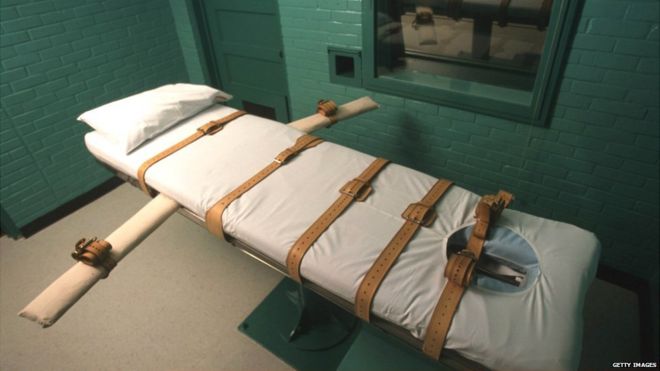By Samuel Miller
Impunity Watch Reporter, North America and Oceania
WASHINGTON, D.C., United States of America —
The U.S. Supreme Court on Monday upheld the use of a controversial drug for lethal injection in executions; however, the Supreme Court may have opened a larger question about capital punishment, when two justices in the minority newly questioned whether the death penalty violates the Constitution. Justice Samuel A. Alito Jr. wrote for the majority that included Chief Justice John G. Roberts Jr. and Justices Antonin Scalia, Anthony M. Kennedy and Clarence Thomas.

The Supreme Court re-instated the death penalty in 1976 after having suspended it earlier in the 1970s. Capital punishment is now used in 31 states and by the federal government.
In the case, called Glossip v Gross, three inmates in Oklahoma argued that the sedative could not achieve the level of unconsciousness required for surgery, meaning severe pain and suffering was likely. But the court, in a 5-4 decision, handed a loss to the inmates after judges ruled they did not prove that midazolam was cruel and unusual when compared to known and available alternatives.
The majority opinion, written by Justice Samuel Alito, was a departure from a series of legal victories for liberals in recent days, including gay-marriage rights and the preservation of a major component of Obamacare. The court’s majority held that prisoners challenging an execution method as posing an unreasonable risk of severe pain must show that the government has overlooked a more humane method of carrying out capital punishment.
In the majority opinion, Alito writes, “The prisoners failed to identify a known and available alternative method of execution that entails a lesser risk of pain, a requirement of all Eighth Amendment method-of-execution claims.” Alito went on to state, “Second, the District Court did not establish that Oklahoma’s use of a massive dose of midazolam in its execution protocol entails a substantial risk of severe pain.”
The four dissenting justices wrote scathing opinions denouncing the approval of the lethal injections, as well as the prisoner’s right to choose the method for their execution. In her dissent, Justice Sonia Sotomayor bitterly denounced the court’s holding that those challenging a particular execution protocol had to show that a more humane method was available.
“Under the Court’s new rule, it would not matter whether the State intended to use midazolam, or instead to have petitioners drawn and quartered, slowly tortured to death, or actually burned at the stake: because petitioners failed to prove there was an available alternative, their challenge would automatically fail.”
Justice Stephen Breyer, in his dissent, raised the issue as to whether the death penalty should be interpreted as constitutional. With the concurrence of Justice Ginsberg, Breyer wrote, “We believe it highly likely that the death penalty now violates the Eighth Amendment.”
Several US states turned to midazolam when European manufacturers stopped supplying sodium thiopental to US prisons because of an EU ban on the sale of products used in lethal injections.
The shortage of various drugs used by the 32 US states that still have capital punishment led to some reintroducing other controversial methods, such as the gas chamber and firing squad.
For more information, please see:
BBC News — US Supreme Court backs use of contentious execution drug – 29 June 2015
CNN — Supreme Court backs use of lethal injection drug – 29 June 2015
Politico — Supreme Court permits lethal injection technique – 29 June 2015
Reuters — Supreme Court upholds lethal injections, blocks pollution rule – 29 June 2015
USA Today — Supreme Court refuses to ban controversial method of execution – 29 June 2015
Washington Post — Supreme Court upholds lethal injection procedure – 29 June 2015


